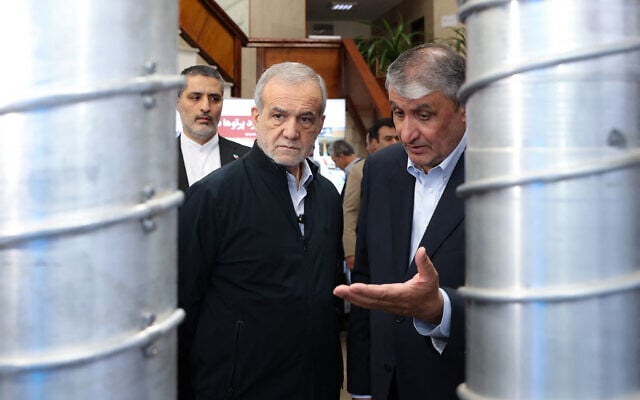
Iranian Foreign Minister Abbas Araghchi, left, and US special envoy Steve Witkoff. (Karen Minasyan/AFP; Chip Somodevilla/Getty Images via AFP)
| Published April 15, 2025
Both sides say a good start was made in Oman, where it is unlikely that Steve Witkoff was pushing for full dismantlement of Tehran’s nuclear program. Netanyahu could find himself in a corner
Iran is seeking to prolong nuclear negotiations, while former President Trump is pushing for a quick deal. Both approaches pose risks to Israel’s national security—either by allowing Iran more time to advance its nuclear program or by forcing through a deal that lacks strong enough safeguards.

A handout picture provided by the Iranian presidency shows President Masoud Pezeshkian (L) and the Atomic Energy Organisation of Iran (AEOI) chief Mohammad Eslami during the “National Day of Nuclear Technology,” in Tehran, on April 9, 2025. (Iranian Presidency/AFP)
🧠 KEY POINTS:
-
Iran’s Strategy: Iranian officials are stalling talks, hoping to gain leverage or stretch time while potentially continuing nuclear advancements under the radar.
-
Trump’s Pressure: Trump, eyeing decisive action, wants a deal finalized soon, warning of military options if Iran drags its feet. His stance risks a rushed agreement that may not meet Israel’s security standards.
-
Israel’s Dilemma:
-
A slow process could let Iran move closer to nuclear capability.
-
A fast-track deal may compromise on necessary enforcement mechanisms.
-
Israel remains skeptical of any outcome that allows Iran to maintain enrichment capacity.
-
-
U.S. Softening on Enrichment: Reports suggest the U.S. may now tolerate Iran enriching uranium up to 3.67%, a departure from the “zero enrichment” policy favored by Israel.
-
Regional Security at Stake: Israel views a nuclear Iran as an existential threat and is monitoring negotiations closely, likely preparing contingency plans.
📊 IMPLICATIONS:
-
For Israel: Strategic uncertainty. Israel may feel compelled to act independently if diplomacy fails to halt Iran’s nuclear ambitions.
-
For U.S. Foreign Policy: A rushed deal could lead to backlash from allies; a drawn-out process could test international patience.
-
For Iran: More time at the table buys technical advancement and negotiating strength, even if it stalls a final deal.
✅ OVERALL TAKEAWAY:
From Israel’s point of view, neither a slow nor a rushed negotiation favors its security. Iran dragging things out lets them build capability, while Trump’s demand for speed risks undercutting the pressure needed for a tougher deal. For Israel, the best outcome would be a comprehensive, enforceable agreement—but that looks harder to achieve as both sides pull in opposite directions.
SOURCE: THE TIMES OF ISRAEL – Iran wants to drag out talks, Trump wants a deal now. Neither is good for Israel





Be the first to comment